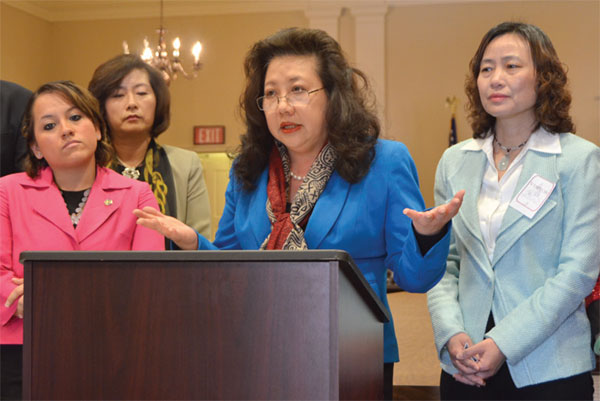MD senate adopts 'comfort women' resolution
A Maryland state Senate joint resolution honoring the "comfort women" in Asia and Pacific Islands during World War II was adopted on Tuesday.
The Senate Joint Resolution 3 stated that "the government of Japan, during its colonial and wartime occupation of Asia and the Pacific Islands from the 1930s through the duration of World War II, commissioned the acquisition of young women, estimated to number more than 200,000, for the sole purpose of sexual slavery to the Imperial Armed Forces, who became known to the world as 'ianfu' or 'comfort women'."
It also said the Maryland General Assembly is "determined to combat human trafficking in modern times through all appropriate legislative action, education initiatives, and commemorations to the victims of this horrible injustice and crime that has been perpetrated against so many people throughout history".
State Senator Susan Lee, who introduced the resolution on Feb 6, told China Daily that it sent out "the message that the crime actually happened and we don't want it to happen any more and certainly will fight again any human slavery and human trafficking".
"I'm against any try to revise history or any try to cover it up; the hurts must be heard," said Lee, the first Asian American to serve in the state Senate and the first minority to be elected to the Montgomery County delegation. Lee said that she has met a number of victims of the war.
"It's not about money for them, it's about justice, because when this happened to them, it destroyed their whole lives," she said. "They are all in their 80s or 90s, and they are dying off. For them, we need to make sure that the history is accurate and correct."
An estimated 30,000 to 200,000 women from China, Korea and other Asian countries were forced to be sex slaves in the 1930s and 1940s.
Chinese researchers' findings indicate the number is about 400,000, according to Peipei Qiu, professor of Chinese and Japanese and director of the Asian Studies Program at Vassar College, New York.
Many of the survivors were "kidnapped by Japanese soldiers and forced to serve as prostitutes, often enduring cruelty such as gang rape, forced abortions, humiliation, and sexual violence, resulting in mutilation, permanent health damage, death or suicide", according to the resolution.
The issue is controversial in Asia, especially when the Japanese government recently offered a different interpretation and attempted to "get the American publishing house McGraw Hill to remove two paragraphs about comfort women from a college textbook", according to The Washington Post.
The book, Traditions and Encounters: A Global Perspective on the Past, said the Japanese Army "forcibly recruited, conscripted and dragooned as many as 200,000 women aged 14 to 20 to serve in military brothels, called 'comfort houses' ". It also says that the Japanese military "massacred large numbers of comfort women to cover up the operation".
It was Japanese Prime Minister Shinzo Abe's attempt to "put a gloss on Japan's wartime history and, in turn, to loosen some of the postwar constraints on its military" to mark the 70th anniversary of war's end, said the Post wrote in February.
Some 19 American historians from Princeton, Columbia and American universities and elsewhere signed a public counterdeclaration in the March issue of Perspectives of History, a magazine of the American Historical Association, to urge their Japanese counterparts not to allow the Japanese government to minimize the prevalence of "comfort women".
McGraw Hill later declined the request from Japan, saying that "scholars are aligned behind the historical fact of comfort women" and that it "unequivocally" stands behind the book.
Sheng Yang in Washington contributed to this story.
|
Senator Susan Lee speaks at a press conference before the Maryland state senate hearing on March 6 on the resolution honoring World War II's "comfort women", in Annapolis, Maryland. The State Joint Resolution 3 was adopted on Tuesday. Provided to China Daily |



















